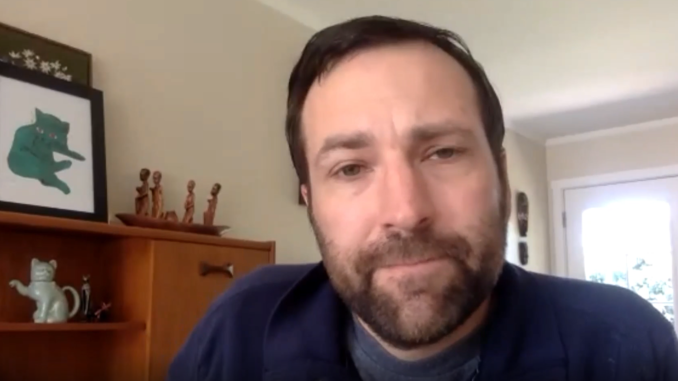
By Tex Yamada–
Ben Allen, State Senator-District #26, led off the virtual meeting, covering three main, controversial subjects: COVID-19, the 2020 elections, and environmental issues at the State and Federal levels.
On the COVID-19 health crisis, Senator Allen with little hesitation states, “California has really distinguished itself as a proactive and effective player in the fight against COVID-19.” He highlighted several courses of action the State Government has taken to combat the impact of the deadly virus: Governor Newsom’s Stay-At-Home order beginning in March, securing medical infrastructure, negotiating relief efforts, launching community support programs, and protecting elections and Democratic processes.
On March 19, Governor Gavin Newsom issued the Stay-At-Home order for California residents to help stem the spread of the COVID-19 pandemic. On April 10, Los Angeles County extended the Stay-At-Home order within its jurisdiction to May 15, speculating that the number of infections would rise significantly if the mandate was lifted. Senator Allen spoke at length about a gradual phasing-in of re-opening the economy while addressing the stay-at-home lifestyle. “It doesn’t mean we have to be in our homes like we are now,” he explains. “We can slowly re-open the economy, but it’s all going to be done based on the extent to which things can be re-opened without contributing to a resurgence in the spread of the virus.”
Senator Allen cautions California residents that combating and overcoming the coronavirus will not be a quick slam dunk. “It’s not going to be like flipping on a switch,” he explains. “When we talk about going back to normal, we’re not going to be back to normal for a long time.”
Ben Allen Addressing PV Democrats
While steering clear of most specifics, Senator Allen painted a picture of COVID-19 road-to-recovery with the following comments, “Certain types of activities will be allowed, but others will not.” He continues, “For example, I don’t think we’re going to be going to tightly packed concerts for anytime in the near future…. Hard to imagine packed sports stadiums opening up for concerts or for sporting events.”
Senator Allen also discussed the elections, both past and upcoming. The reviews and comments were mixed. About vote-by-mail, he had these comments. “Thankfully, California is already ahead of many states since the majority of Californians already received their ballot in the mail,” he says. “In the November 2018 General Election, 65% of ballots cast were vote-by-mail ballots. Other states are nowhere near as far along in this area as California.”
Although vote-by-mail has grown in popularity, Senator Allen also believes developing and maintaining in-person voting at polling places and voting centers remains a viable and important option.
He feels that voters with language issues, the elderly, the physically disabled, or even voters without a permanent address should have the option of voting in-person. “I am concerned about shutting down all of the vote centers and I think there are people who might be disenfranchised,” he says.
The Senator also touched on voting in person in Los Angeles County, which rolled out a new voting system, Voting Solutions For All People (VSAP), for the March 3 Primary Election. He acknowledged the overall review was not good and cited examples of voting machine failure and long lines on Primary Election Day March 3. “You saw situations where vote centers in Los Angeles County had lines around the block in the evening on election day,” he explains. “And you had 20 beautiful ready-to-go voting booths. But unfortunately, only five of them were in use because there were glitches and electronic problems with the other 15.”
Looking ahead to the General Election in November, Senator Allen believes making the vote by mail option available to all registered voters is but one safeguard against an unreliable voting system. Also, establishing more vote centers at strategic locations can provide additional options for in-person voters who encounter long lines at any given vote center.
After wrapping up the exchange on elections, Senator Allen transitioned to environmental issues. One of the highlights was the discussion of implementing effective environmental/climate policy while sustaining economic/job growth. According to Senator Allen, California implemented an aggressive climate change policy, yet added 2.7 million jobs and posted a 2.9% growth in Gross Domestic Product (GDP) over the last seven years. Senator Allen points out that California is out to disprove the theory that an aggressive environmental policy is harmful to economic growth and overall employment.
“These folks out there who say that doing right by the environment in regard to climate change means you’re going to harm the economy. That’s just not the experience in California,” he exclaims. “We have the numbers to back it up,” he continues. “So, part of what we are trying to do is model for the rest of the world.”
Senator Allen also discussed numerous environmental problems created by climate change across the United States. Of course, California has experienced devastating losses due to wildfire and mudslides, mostly in summer and winter months. “There’s no question in any serious scientist’s mind that the ferocity and intensity of the wildfires that we’ve seen in the last years have been absolutely stoked by climate change,” insists Senator Allen.
Senator Allen fielded several questions from the club members attending the Zoom meeting/conference. Connie Sullivan’s question zeroed in on the status of the Rainy-Day Fund, a surplus of funds accumulated mostly from Governor Brown’s two terms in office. Senator Allen’s response did not require much critical thinking. “It’s going to be depleted. The real question is: Is it going to be used in one year, two years, or three years? That’s really the interesting, tactical question that Governor Newsom and the Leadership Team are debating.” He further explained that the emergency created by COVID-19 will likely have a major impact on the Rainy-Day Fund status. Judy Herman wanted to know what effects the financial problems and on-going concerns about the U.S. Post Office would have on the General Election in November regarding vote by mail? Senator Allen is worried about the U.S. Post Office financial problems and believes it is a huge problem, saying “I really worry about this.”

Leave a Reply